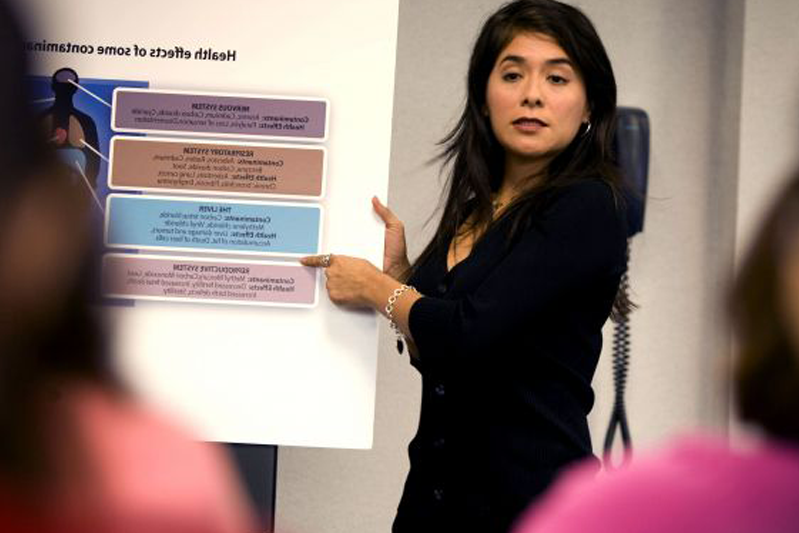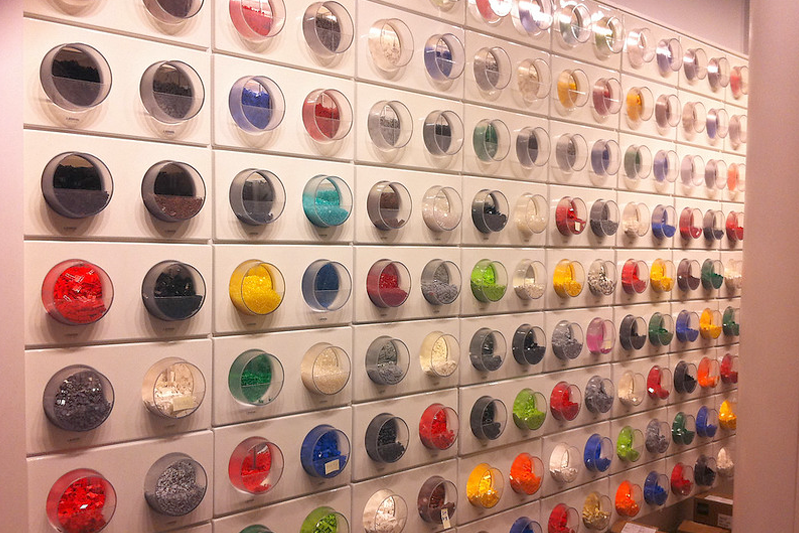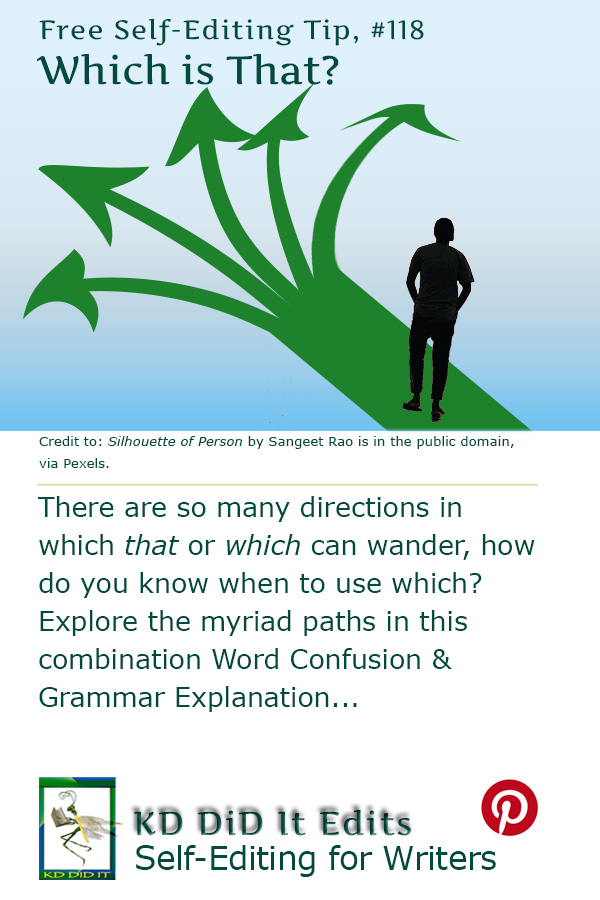Revised as of
14 July 2023
Which and that are both words that are confused as well as a grammar issue, and I’m as guilty as anyone else, although my preference does tend to run to which. Now that I’ve written this up, I’ll have to do a better job of paying attention . . . sigh . . .
That is more properly used when indicating specifics — an essential — while which is more general, nonrestrictive or nonessential. Those brushes as opposed to a bunch of brushes which are hanging in the garage. That program on the telly about the River Styx or programs which are on the telly. That broom as opposed to any one of the brooms in the closet.
It is a minute point, but once you start paying attention, it does get easier.
Rules Change Depending Upon Necessity
The rules can change depending upon whether the phrase/clause is considered essential or nonessential. Naturally, since this is English, there are a number of different pairings that are used to describe the same thing: restrictive or nonrestrictive and defining or non-defining. As I run across others, I’ll add them to the list.
Grammar Explanations and Word Confusions sometimes . . .
. . . involve the same words as it does in here in this post on “xx”. Whereas a Word Confusion is a pair (or more) of words that are confused spelling-wise with each other, a Grammar Explanation may jump in because of the confusion involved in how the words are used within the structural rules and principles of English.
Sometimes I run across an example that helps explain better or another “also known as”. Heck, there’s always a better way to explain it, so if you have an idea or suggestion that makes quicker and/or better sense, I would appreciate suggestions and comments from anyone . . . as well as questions on issues with which you are frustrated. If you’d like to track it, bookmark this page.
If you found this combination Grammar Explanation and Word Confusion post on “Which is That?” interesting, consider subscribing to KD Did It, if you’d like to track this post for future updates.
| Essential / Restrictive / Defining | Nonessential / Nonrestrictive / Non-defining |
|---|---|
| Indicates that the phrase/clause is important to the meaning of the sentence. It will not be understandable without this clarification. | Indicates that the phrase/clause is not important to the meaning of the sentence. If it were removed, the sentence would still make sense. |
| The store honored the complaints that were less than 60 days old.
Store only honored those complaints that were 60 days old or less. |
The store honored the complaints, which were less than 60 days old.
Store honored all the complaints. They just happened to all be 60 days old or less. |
| The coat that Dan had on yesterday was new.
The coat Dan had on yesterday was new as opposed to the coat he wore today which he’s had forever. |
The coat, which Dan had on yesterday, was made of pure alpaca and cost a bomb.
We don’t need to know Dan was wearing it yesterday. The essential information is that it was alpaca and cost a lot. |
| The horse that is in the paddock is six years old.
We’re not talking about any six-year-old horse, we’re talking about the one in the paddock. |
The horse, which is in the paddock, is six years old.
The horse would be six years old wherever it was. |
You may want to read “Grammar: Essential and Nonessential Rules” for more on the differences between essential and nonessential.
Word Confusions . . .
. . . started as my way of dealing with a professional frustration with properly spelled words that were out of context in manuscripts I was editing as well as books I was reviewing. It evolved into a sharing of information with y’all. I’m hoping you’ll share with us words that have been a bête noire for you from either end.
If you found this post on “Which is That?” interesting, consider tweeting it to your friends. Subscribe to KD Did It, if you’d like to track this post for future updates.
| That | Which |
|---|---|
| Part of Grammar: | |

Woman Pointing by Cade Martin, Dawn Arlotta, USCDCP is in the public domain, via Pixnio. — It’s that one! |

Pick-a-Brick Wall by Chris Christian is under the CC BY-SA 2.0 license, via Flickr. — Which brick would you pick? |
| Adjective Plural: those Adverb; Conjunction; Determiner Plural: those Pronoun Plural: those |
Adjective, interrogative or relative; Pronoun, interrogative or relative; Determiner, a.k.a. Identifier, nonrestrictive |
| Best to use THAT (it’s a definite article) when the information is essential to understanding the sentence.
CAUTION: Does not use a comma when the clause is essential. CAUTION: That never introduces a nonessential clause. British English, may use that or which to introduce a restrictive relative clause when they are referring to things and not people. Adjective: Referring to a specific person or thing Singling someone or something out Adverb: To such a degree
Conjunction: Expressing a reason or cause A result A purpose, hope, or intention Determiner, a.k.a., Restrictive Identifier or Definite Article:
Referring to a specific thing previously mentioned, known, or understood [Usually with clause] Used in singling out someone or something and ascribing a distinctive feature to them Referring to a specific person or thing assumed as understood or familiar to the person being addressed Pronoun: Singling someone or something out Pronoun, relative: |
Best to use WHICH for nonrestrictive or nonessential clauses, although it is used for essential clauses too.
CAUTION: Use a comma before which when it’s a nonrestrictive pronoun. Determiner, a.k.a., Nonrestrictive Identifier or Non-definite Article: Used with a noun in requesting that its referent be further specified, identified, or distinguished from the other members of a class Whatever of a class
Used in relative clauses with inanimate antecedents Interrogative Adjective OR Pronoun: Relative Adjective OR Pronoun: |
| Examples: | |
| Adjective: Look at that man there. The speaker is pointing out a particular man. How much are those brushes? I lived in Sierra Leone at that time. Millions of dollars were spent in that election. I have always envied those people who make their own bread. Adverb: He wasn’t that far away. The fish I caught was that big, perhaps even bigger. Conjunction: It is possible that we have misunderstood. He seemed pleased that I wanted to continue. Oh, that he could be restored to health. Determiner: How much are those brushes? Do you want this one or that one? He lived in Mysore at that time. Seven people died in that incident. I have always envied those people who make their own bread. Where is that son of yours? I let him spend all that money on me. Dad got that hunted look. Pronoun: This is stronger than that. That’s a good idea. This is the book The year Relative Pronoun: The library did not have the book that I wanted. |
Nonessential Which |
| Determiner: The lawnmower, which is in the shed, is broken. There is only one lawnmower in the shed, so there is no essential need to differentiate. Your claim ought to succeed, in which case the damages will be substantial. Substantial damages can be implied if a claim is successful, therefore which is nonessential. The house, which is old, is in poor repair. Adjective, relative: Pronoun, relative: Mary and I went to the movies last night, which got out at ten. |
|
| Essential Which | |
| Determiner: Which way is the wind blowing? Which house did you want to buy? Which did you find? I wondered which apples were cheaper. Bring which car you want to drive. Adjective, interrogative: “How can you govern a country which has 246 varieties of cheese?” (Nordquist) Adjective, relative: Pronoun, interrogative: Which of the suspects murdered her? Pronoun, relative: It was a crisis for which he was totally unprepared. Percy is the horse on which he had ridden. You may choose which you like. Choose which of the cars suit you. |
|
| History of the Word: | |
| Old English thæt is the nominative and accusative singular neuter of se meaning the and is of Germanic origin and related to the Dutch dat and the German das. | Old English hwilc, which is from the Germanic bases of who and alike. |
C’mon, get it out of your system, bitch, whine, moan . . . which words are your pet peeves? Also, please note that I try to be as accurate as I can, but mistakes happen or I miss something. Email me if you find errors, so I can fix them . . . and we’ll all benefit!
Satisfy your curiosity about other Word Confusions on its homepage or more generally explore the index of self-editing posts. You may also want to explore Book Layout & Formatting Ideas, Formatting Tips, Grammar Explanations, Linguistics, Publishing Tips, the Properly Punctuated, Writing Ideas and Resources, and Working Your Website.
Resources for Which is That?
Apple Dictionary.com
Dictionary.com: which
Nordquist, Richard. “Definition and Examples of Interrogative Words in English.” ThoughtCo. Updated 16 Aug 2019. Web. n.d. <https://www.thoughtco.com/interrogative-words-term-1691182>.
Pinterest Photo Credits
Silhouette of Person by Sangeet Rao is in the public domain, via Pexels.


